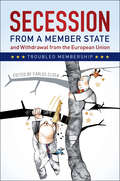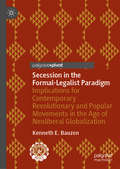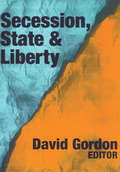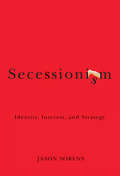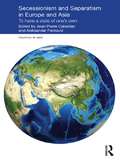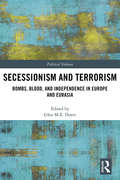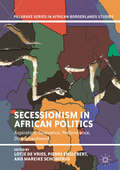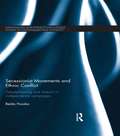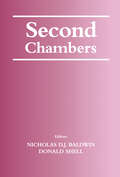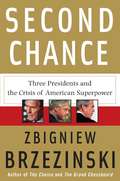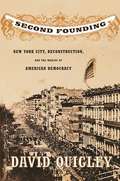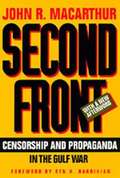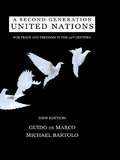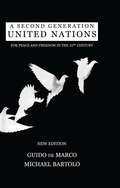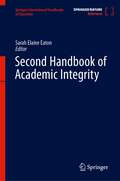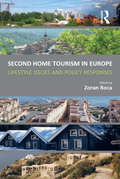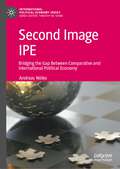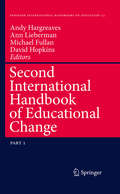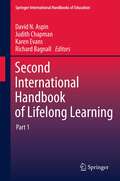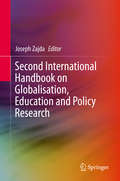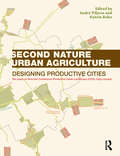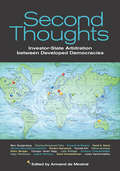- Table View
- List View
Secession from a Member State and Withdrawal from the European Union: Troubled Membership
by Carlos ClosaThis is the first book to jointly scrutinise two existential issues for the EU: withdrawal of a member state (i. e. Brexit) and territorial secession (affecting Scotland, Catalonia and beyond). The book applies normative and empirical analysis, explores new approaches and discusses the deep theoretical problems unleashed by these processes. Featuring a superb constellation of legal and political science scholars, the book combines specific legal analysis and considers the political dynamics behind the processes. It provides extensive coverage and sophisticated analysis of the interpretation of Article 50 and the possible consequences it may have. The implications of withdrawal and secession on EU citizenship are discussed in depth and there is an overview of the evolving nature of the relationship between the regions and the EU. Finally, there is an engaging normative discussion on the deeper meaning of these two processes with respect to the objective of European integration.
Secession in the Formal-Legalist Paradigm: Implications for Contemporary Revolutionary and Popular Movements in the Age of Neoliberal Globalization
by Kenneth E. BauzonThis book explores how formal-legalism, as the dominant paradigm of explanation, has sought to explain the phenomenon of secessionism among its practitioners as a problem for the modern state. This study bears how these practitioners have, over time, described, defined, and proposed to solve secessionism and related political problems within the logic of their paradigm. In the process, the book reconstructs the formalist worldview and the practitioners’ fundamental presuppositions which, to them, render comprehensible and meaningful the occurrence of events, like secession, as well as means of dealing with it. More significantly, the book exposes a debilitating flaw of formal-legalist paradigm as it fails to account for other principles of mobilization in political and social life that defy formal-legal rules such as those based on race, ethnicity, language, culture, and material factors. Narrow adherence to textual sources and the literal approach, have led formal-legalists to miss, willfully ignore, or endorse the paradigm's strategic association with state power, evolving since the dawn of the Enlightenment. Formal-legalism has lent itself amenable to the interests of the state and to the variable construction of the meaning of the law devoid of original spirit and universality but conforming with the specific interests of the state or, for that matter, the prevailing American empire, both spatially and temporally. Accounting for this anomaly, the historical materialist perspective is considered, with appropriate historical and contemporary illustrations, as a relevant explanatory alternative to the now-obsolescent formal-legalist paradigm. With the assumption that, indeed, economic and material considerations such as those demanded by the dominant class elements within the state underlie the rationale for the state, formal-legalism has evolved from one that initially provided a presumed objective view of society to one that has subjectively become an essential part of the cultural suprastructure that allows these elements to command the state as a principal tool for labor- and value-extraction during what is popularly known as contemporary neoliberal globalization.
Secession, State, and Liberty
by David GordonThe political impulse to secede - to attempt to separate from central government control - is a conspicuous feature of the post-cold war world. It is alive and growing in Canada, Russia, China, Italy, Belgium, Britain, and even the United States Yet secession remains one of the least studied and least understood of all historical and political phenomena. The contributors to this volume have filled this gap with wide-ranging investigations - rooted in history, political philosophy, ethics, and economic theory - of secessionist movements in the United States, Canada, and Europe.
Secessionism
by Jason SorensUsing innovative methods to analyze both advanced democracies and developing countries, Jason Sorens shows how central governments can alleviate or increase ethnic minority demands for regional autonomy. He argues that when countries treat secession as negotiable and provide legal paths to pursuing it rather than absolutely prohibiting independence, violence is far less likely. Additionally, independence movements encourage government policies of decentralization that may be beneficial to regional minorities. An informative investigation of the root causes of political violence, Secessionism provides a clear-eyed look at independence movements for both governments and secessionists.
Secessionism and Separatism in Europe and Asia: To Have a State of One’s Own (Politics in Asia)
by Jean-Pierre Cabestan Aleksandar PavkovićThe boundaries between secessionism and separatism are often blurred, and in many cases study of secessionism encompasses that of separatism and vice versa. Recognising this inherent relationship, this book provides a comparative survey of recent attempts at secession and separatist movements from across Europe and Asia, and assesses the responses of the respective host governments. The essays address two main questions which arise from the relationship between state governments and secessionist movements: first, how secessionist or separatist movements gather support and mobilize their target populations and second, how central political authorities respond to the challenges that secessionist or separatist movements pose to their capacity to control the country. With political analysis of recent cases ranging from the Balkans, the USSR, the UK and the Basque Country, to Sri Lanka, Burma, China, Tibet and Taiwan, the authors identify both similarities and differences in the processes and outcomes of secessionist and separatist movements across the two distinct regions. This volume will be an invaluable resource for those who wish to understand the dynamics of secessionist movements and as such will appeal to students and scholars of Asian and European politics, comparative politics, international relations and conflict studies. It will also be helpful to practitioners and policy-makers who wish to understand and contribute to the resolution of such conflicts.
Secessionism and Terrorism: Bombs, Blood and Independence in Europe and Eurasia (Political Violence)
by Glen DuerrThis book examines secessionist terrorism in a comparative context across Europe and Eurasia. The volume seeks to uncover comparative linkages between terrorism and secessionism; specifically examining terrorist organizations that also have a political goal of independence. It examines a wide range of case studies, including the IRA in Northern Ireland, ETA in the Basque Country, FLNC in Corsica and ARD in Brittany, KLA in Kosovo, PKK and TAK in Turkish Kurdistan, and IK in Chechnya. In doing so, the book shows the linkages in terrorist tactics and demands, as well as when and how ceasefires come into place. Ultimately, none of the terrorist organizations studied here has obtained their maximalist goal of gaining independence, but each has caused significant bloodshed, and has contributed to the debate on the future of governance in Europe and Eurasia. The major strength of this format is to glean wider lessons on ethno-nationalism, as well as the causes and outcomes of terrorist actions. Each case study also updates the literature on the individual cases to provide the most recent account of events in these countries. This book will be of much interest to students of terrorism and political violence, ethnic conflict, nationalism, European politics and International Relations in general.
Secessionism in African Politics: Aspiration, Grievance, Performance, Disenchantment (Palgrave Series in African Borderlands Studies)
by Mareike Schomerus Lotje De Vries Pierre EnglebertSecessionism perseveres as a complex political phenomenon in Africa, yet often a more in-depth analysis is overshadowed by the aspirational simplicity of pursuing a new state. Using historical and contemporary approaches, this edited volume offers the most exhaustive collection of empirical studies of African secessionism to date. The respected expert contributors put salient and lesser known cases into comparative perspective, covering Biafra, Katanga, Eritrea and South Sudan alongside Barotseland, Cabinda, and the Comoros, among others. Suggesting that African secessionism can be understood through the categories of aspiration, grievance, performance, and disenchantment, the book's analytical framework promises to be a building block for future studies of the topic.
Secessionism: Identity, Interest, and Strategy
by Jason SorensUsing innovative methods to analyze both advanced democracies and developing countries, Jason Sorens shows how central governments can alleviate or increase ethnic minority demands for regional autonomy. He argues that when countries treat secession as negotiable and provide legal paths to pursuing it rather than absolutely prohibiting independence, violence is far less likely. Additionally, independence movements encourage government policies of decentralization that may be beneficial to regional minorities. An informative investigation of the root causes of political violence, Secessionism provides a clear-eyed look at independence movements for both governments and secessionists.
Secessionist Movements and Ethnic Conflict: Debate-Framing and Rhetoric in Independence Campaigns (Routledge Studies in Nationalism and Ethnicity)
by Beata HuszkaThis book analyses how national independence movements’ rhetoric can inflame or dampen ethnic violence. It examines the extent to the power of words matters when a region tries to break away to become a nation state. Using discourse analysis, this book examines how the process of secession affects internal ethnic relations and analyses how politicians interpret events and present arguments with the intention to mobilize their constituencies for independence. With in-depth case studies on the Slovenian, the Croatian and the Montenegrin independence movements, and by looking at cases from Indonesia and Spain, the author investigates how rhetoric affect internal ethnic relations during secession and how events and debate shape each other. The author demonstrates how in some cases of self-determination elites push for a higher level of sovereignty in the name of economic advancement, whereas in other cases, self-determination movements refer to ethnic identity and human rights issues. Explaining how and why certain discourses dominate some independence movements and not others, Secessionist Movements and Ethnic Conflict will be of interest to students and scholars of politics, history, nationalism, ethnic conflict and discourse analysis.
Second Chambers
by Nicholas D.j. Baldwin Donald ShellNotwithstanding the fact that among the parliaments of the world, 38 per cent have Second Chambers (67 out of 179), Second Chambers themselves have only rarely been the focus of attention from politicians and have almost totally been ignored by academics. This work sets about examining them.
Second Chance: Three Presidents and the Crisis of American Superpower
by Zbigniew BrzezinskiAmerica’s most distinguished commentator on foreign policy, former National Security Adviser Zbigniew Brzezinski, offers a reasoned but unsparing assessment of the last three presidential administrations’ foreign policy. Though spanning less than two decades, these administrations cover a vitally important turning point in world history: the period in which the United States, having emerged from the Cold War with unprecedented power and prestige, managed to squander both in a remarkably short time. This is a tale of decline: from the competent but conventional thinking of the first Bush administration, to the well-intentioned self-indulgence of the Clinton administration, to the mortgaging of America’s future by the "suicidal statecraft” of the second Bush administration. Brzezinski concludes with a chapter on how America can regain its lost prestige. This scholarly yet highly opinionated book is sure to be both controversial and influential.
Second Founding
by David QuigleyAt the close of the Civil War, Americans found themselves drawn into a new conflict, one in which the basic shape of the nation's government had to be rethought and new rules for the democratic game had to be established. In this superb new study, David Quigley argues that New York City's politics and politicians lay at the heart of Reconstruction's intense, conflicted drama. In ways that we understand all too well today, New York history became national history.The establishment of a postwar interracial democracy required the tearing down and rebuilding of many basic tenets of American government, yet, as Quigley shows in dramatic detail, the white supremacist traditions of the nation's leading city militated against a genuine revision of America's racial order, for New York politicians placed limits on the possibilities of true Reconstruction at every turn. Still, change did occur and a new America did take shape. Ironically, it was in New York City that new languages and practices for public life were developing which left an indelible mark on progressive national politics. Quigley's signal accomplishment is to show that the innovative work of New York's black activists, Tammany Democrats, bourgeois reformers, suffragettes, liberal publicists, and trade unionists resulted in a radical redefinition of reform in urban America.
Second Front: Anglo-American Rivalry and the Hidden Story of the Normandy Campaign
by Marc MilnerA revelatory new account of the Second World War—and how bitter competition between the Allies would shape the postwar world In June 1944, an Allied army of British, American, and Canadian troops sought to open up a Second Front in Normandy. But they were not only fighting to bring the Second World War to an end. After decades of Anglo-American struggle for dominance, they were also contending with one another—to determine who would ascend to global hegemony once Hitler&’s armies fell. Marc Milner traces this bitter rivalry as it emerged after the First World War and evolved during the fragile peace which led to the Second. American media and domestic politics dominated the Allied powers&’ military strategy, overshadowing the contributions of Britain and the remarkably critical role played by Canada in establishing this Second Front. Culminating in the decisive Normandy campaign, Milner shows how the struggle for supremacy between Churchill and Roosevelt changed the course of the Second World War—and how their rivalry shaped our understanding of the Normandy campaign, and the war itself.
Second Front: Censorship and Propaganda in the Gulf War
by John R. MacarthurBased on interviews with Tom Brokaw, Peter Jennings, Dan Rather, Ben Bradlee, Katherine Graham, Pete Williams and others, Second Front documents in vivid detail the behind-the-scenes activities by the U. S. and Kuwaiti governments, as well as the media's own cooperation when its rights to observe, question, and report were increasingly limited.
Second Generation United Nations
by De_MarcoFirst published in 1997. Routledge is an imprint of Taylor & Francis, an informa company.
Second Generation United Nations
by Michael BartoloAs the United Nations moves beyond its fiftieth anniversary into the new millennium, it is faced with a new global system fraught with political and economic tensions that can no longer be handled with models that defined the organization when it was founded in 1945. An innovative vision for a restructuring of the United Nations, this book offers an insider's look at how the UN can respond more effectively to the challenges of the future in an age of globalization.
Second Handbook of Academic Integrity (Springer International Handbooks of Education)
by Sarah Elaine EatonThe book brings together diverse views from around the world and provides a comprehensive overview of academic integrity and how to create the ethical academy. At the same time, the Handbook does not shy away from some of the vigorous debates in the field such as the causes of academic integrity breaches. There has been an explosion of interest in academic integrity in the last 20-30 years. New technologies that have made it easier than ever for students to ‘cut and paste’, coupled with global media scandals of high profile researchers behaving badly, have resulted in the perception that plagiarism is ‘on the rise’. This, in combination with the massification and commercialisation of higher education, has resulted in a burgeoning interest in the importance of academic integrity, how to safeguard it and how to address breaches appropriately. What may have seemed like a relatively easy topic to address – students copying sources without attribution – has in fact, turned out to be a complex, interdisciplinary field of research requiring contributions from linguists, psychologists, social scientists, anthropologists, teaching and learning specialists, mathematicians, accountants, medical doctors, lawyers and philosophers, to name just a few.Because of this broad interest and input, this handbook serves as the single authoritative reference work which brings together the vast, growing, interdisciplinary and at times contradictory body of literature. For both established researchers/practitioners and those new to the field, this Handbook provides a one-stop-shop as well as a launching pad for new explorations and discussions.
Second Home Tourism in Europe: Lifestyle Issues and Policy Responses
by Zoran RocaBringing together a wide range of studies from twelve European countries, this book offers a state-of-the-art overview of the driving forces behind spatial diversity and social complexity inherent in second home expansion in all parts of the continent - from Scandinavia to the Mediterranean and from the British Isles to Russia - in the context of contemporary mobility patterns largely induced by tourism. As befits the overall conception of the book as a compendium of current second home research, planning and policy issues, the book endorses the following: multidisciplinary approaches to the second home phenomenon as an expression of the ’leisure class’ mobility and recreation-based lifestyles, as well as a constitutive element of post-productivist land-use patterns and landscape change; and socio-economic and territorial development planning and policy-related perspectives on social change and spatial re-organization provoked by the expansion of second home tourism in times of prosperity and crisis. ’This book shows that second home tourism has become such an important sector of the economy that it is no longer possible to let it develop freely: it is the source of new forms of social deprivation; it generates residential economies that are particularly sensitive to the economic cycle; it often impairs beautiful landscapes and increases human pressure on natural environments. As a result, it is one of the major physical planning stakes of touristic areas’ (From the concluding essay by Paul Claval, Université de Paris I - Sorbonne, Paris, France).
Second Image IPE: Bridging the Gap Between Comparative and International Political Economy (International Political Economy Series)
by Andreas NölkeThis book argues that the lack of adequate theories of contemporary capitalism is due to the increasing separation of the sub-disciplines of Comparative and International Political Economy. Theorizing only takes place in one of the two over-specialized sub-disciplines of Political Economy, thereby leading to a neglect of the interplay between national and international dimensions of capitalism. The author seeks to rectify this gap by developing a theory of Second Image IPE. Based on the “second image” notion developed by Kenneth Waltz, he furthers the classical theoretical approaches as developed by Peter Gourevitch and Peter Katzenstein. For this purpose, he incorporates recent analytical developments in Comparative Capitalism and Growth Model analysis. The book demonstrates the usefulness of Second Image IPE theory by studying the major empirical topics of Global Political Economy, including security, finance, regional integration, trade, production and global order.
Second International Handbook of Educational Change
by David Hopkins Andy Hargreaves Michael Fullan Ann LiebermanThe two volumes of the second edition of the International Handbook of Educational Change comprise a totally new, and updated collection of the most critical and cutting-edge ideas in educational change. Written by the most influential thinkers in the field, these volumes cover educational change at both the theoretical and practical levels. The updated handbook remains connected to the classical concerns of the field, such as educational innovation, reform, and change management, and also offers new insights into educational change that have been brought about by social change and shifting contexts of educational reform. Like the first best selling Handbook, this one will also undoubtedly become an essential resource for people involved in all spheres of education, from classroom teachers, teacher leaders and administrators to educational researchers, curriculum developers, and university professors. No other work provides such a wide-ranging and comprehensive examination of the field of educational change.
Second International Handbook of Lifelong Learning
by Karen Evans Richard Bagnall David N. Aspin Judith ChapmanThe second edition of the International Handbook of Lifelong Learning is extensive, innovative, and international in scope, remit and vision, inviting its readers to engage in a critical re-appraisal of the theme of "lifelong learning". It is a thorough-going, rigorous and scholarly work, with profound and wide-ranging implications for the future of educating institutions and agencies of all kinds in the conception, planning and delivery of lifelong learning initiatives. Lifelong learning requires a wholly new philosophy of learning, education and training, one that aims to facilitate a coherent set of links and pathways between work, school and education, and recognises the necessity for government to give incentives to industry and their employees so they can truly "invest" in lifelong learning. It is also a concept that is premised on the understanding of a learning society in which everyone, independent of race, creed or gender, is entitled to quality learning that is truly excellent. This book recognises the need for profound changes in education and for goals that are critically important to education, economic advancement, and social involvement. To those concerned about the future of our society, our economy and educational provision, this book provides a richly illuminating basis for powerful debate. Drawing extensively on policy analyses, conceptual thinking and examples of informed and world-standard practice in lifelong learning endeavours in the field, both editors and authors seek to focus readers' attention on the many issues and decisions that must be addressed if lifelong learning is to become a reality for us all.
Second International Handbook on Globalisation, Education and Policy Research
by Joseph ZajdaThis handbook presents a global overview of developments in education and policy change during the last decade. It provides an accessible, practical and comparative source of current research that examines the intersecting and diverse discourses of this important issue. Divided into two parts, the handbook first examines globalisation and education policy reforms, including coverage of main trends as well as specific policy issues such as gender, equity, minorities and human rights. Next, the handbook offers a comparative perspective that evaluates the ambivalent and problematic relationship between globalisation, the state and education reforms globally. It features coverage on curricula issues and education reforms in schools around the world as well as the curriculum in the global culture. Now more than ever there is a need to understand and analyse both the intended and the unintended effects of globalisation on economic competitiveness, educational systems, the state and relevant policy changes--all as they affect individuals, the higher education sector, schools, policy-makers and powerful corporate organisations across the globe. By examining some of the major education policy issues, particularly in the light of recent shifts in education and policy research, this handbook offers readers a comprehensive picture of the impact of globalisation on education policy and reforms. It will serve as a vital sourcebook of ideas for researchers, practitioners and policy makers in education.
Second Nature Urban Agriculture: Designing Productive Cities
by André Viljoen Katrin BohnWinner of the 2015 RIBA President's Award for Outstanding University Located Research This book is the long awaited sequel to "Continuous Productive Urban Landscapes: Designing Urban Agriculture for Sustainable Cities". "Second Nature Urban Agriculture" updates and extends the authors' concept for introducing productive urban landscapes, including urban agriculture, into cities as essential elements of sustainable urban infrastructure. It reviews recent research and projects on the subject and presents concrete actions aimed at making urban agriculture happen. As pioneering thinkers in this area, the authors bring a unique overview to contemporary developments and have the experience to judge opportunities and challenges facing those who wish to create more equitable, resilient, desirable and beautiful cities.
Second Term: A Novel
by J. M. AdamsA lame duck president's desperate power grab threatens democracy in the United States—can former intelligence operative and single mother Cora Walker prevent catastrophe? September 2012. Cora Walker, a DIA defense operative, learns of a terrorist plot in Benghazi and rushes to a secret installation to stop it. When her superiors ignore her dire warnings, she's forced to mount an unsanctioned attempt to thwart the attack. Her team barely repels the large force of invaders determined to kill Americans. Sixteen years after her heroic actions in Benghazi, Cora is the press secretary for the Speaker of the House. As a single mom, she's struggling to balance her demanding job and her home life. Soon, things get more complicated at work as the lame duck president suspends habeas corpus and begins arresting members of Congress in a desperate attempt to retain power. Cora springs into action to save the Speaker and prevent catastrophe. She'll have to work strategically to keep everyone safe—alliances turn sour, and her trust in others begins to falter. It's an uphill battle for Cora until an explosive finale exposes what can really happen to democracy when political extremism reaches new heights.Perfect for fans of Vince Flynn and Brad Thor
Second Thoughts: Investor State Arbitration between Developed Democracies
by Armand De MestralSince the first international investment agreement was negotiated nearly six decades ago, developed countries have sought to protect their investors against the possible failure of host countries (usually a developing country) to respect treaty standards. The North American Free Trade Agreement and the European Energy Charter, both dating from 1994, marked the first instances of developed countries signing an agreement containing provisions for investor-state arbitration (ISA) between themselves. Since then, ISA has become a standard feature of international investment agreements, even as the chorus of protest against ISA from civil society groups (and some nations) has grown louder. Second Thoughts gathers the reflections of fourteen international investment experts, examining experiences of ISA in Canada and various parts of the world, and asking whether ISA is appropriate between developed democracies.
